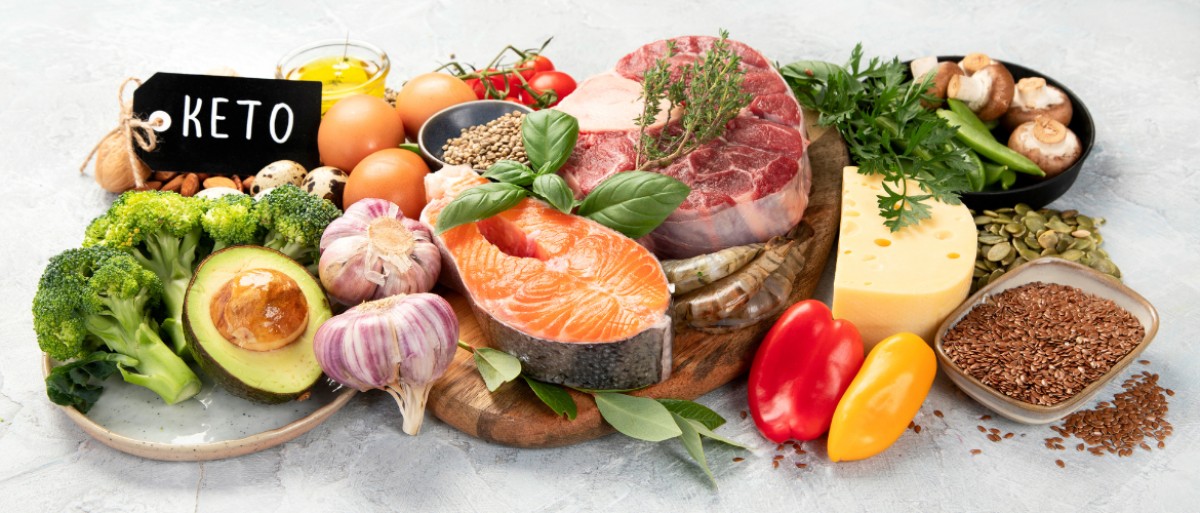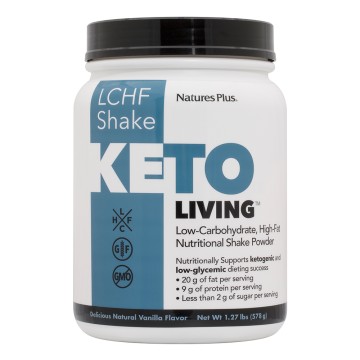What is the ketogenic diet?
Η
ketogenic diet, also known as
keto diet, is a way of eating that involves very few
carbohydrates much more
fat. It has been used for centuries to help treat some ailments. For example, in the 19th century he helped manage it
diabetes. In 1920, it was discovered that it is also effective for children with
epilepsy that were unresponsive to medication. It has also been tested for its treatment
cancerOf
diabetes, polycystic ovary syndrome and
Alzheimer's disease. Nowadays, the keto diet has also become popular as a method to lose weight, especially with the increased popularity of low-carb diets.
carbohydrates from the 70s onwards.
How does it work;
Η
ketogenic diet is based on a simple idea: if you significantly reduce the amount of
carbohydrates that you eat, your body starts to burn
fat for energy instead of
sugars (glucose). This is because our cells normally use glucose from themselves
carbohydrates as the main source of energy. When glucose is lacking, the body begins to convert fat into
ketones, an alternative energy source.
This process is called
ketosis. It's natural and happens when we don't eat for a few hours, like when we sleep. THE
ketogenic diet it seeks to keep the body in this state to burn fat more efficiently.
When the are reduced
carbohydrates the body uses it
fat as fuel, agent
ketones. This can help with weight loss as the body burns fat for energy.
What are ketones?
When we follow a diet that burns mostly fat, our body begins to use stored fat for energy. This means that the
fatty acids they are released into the blood and most parts of the body can use them for energy.
However, the brain and nervous system cannot use them directly
fatty acids for energy. This is because fatty acids cannot cross the barrier that protects the brain from substances in the blood.
To solve this problem, the body converts part of the fatty acids into
ketones, which are a form of energy that the brain can use. This process is done in
liver.
The
ketones it is a type of "reserve fuel" produced when the body burns
fat instead
sugars. They are completely independent of recruitment
carbohydrates.
The brain can use them
ketones very efficient for energy, covering up to 70% of its energy needs.
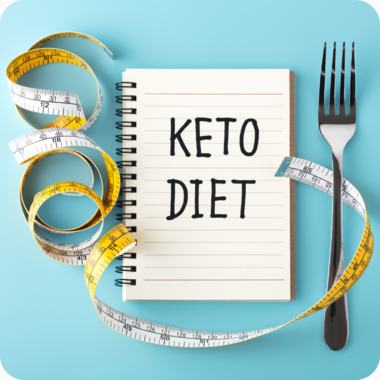
Benefits of the Ketogenic Diet
1. Weight LossΗ
keto diet can help you lose weight faster than other diets, especially
first 3 to 6 months. This is because the body burns more calories to convert fat into energy, as opposed to carbohydrates. Also, a diet higher in fat and protein can keep you fuller for longer, meaning you end up eating less. However, this has not been confirmed yet.
2. Reduces appetiteΗ
ketogenic diet is a way of eating based on eating few carbohydrates, an appropriate amount of proteins and more fats. This diet is adapted according to our personal information such as height, weight, how active we are every day, our age and the goals we have set for ourselves. In this way, it helps not to feel hungry while at the same time meeting our nutritional needs.
3. Reduces the risk of certain types of cancerΗ
insulin is a type of hormone that helps our body use or store the sugar we get from food as energy. Diets that significantly limit carbohydrates, such as
ketogenic diets, they force us to use this energy quickly so we don't need to store it. This leads to the body producing less insulin. Reduced levels
insulin they may help protect against some forms of cancer or even slow the growth of cancer cells.
4. Cholesterol loweringIn addition, the reduction of insulin in our body, due to these diets, can prevent the production of more
cholesterol. This in turn means that the risk of high blood pressure, hardening of the arteries, heart failure and other heart problems is reduced.
5. Athletic performanceMany athletes use it
keto diet to make their bodies leaner, improve their athletic performance and protect their brains from injuries such as blows to the head in sports such as boxing, MMA, football and rugby. THE
keto diet helps to protect the muscles and maintain their energy reserves.
What can I eat?
At
ketogenic diet, we focus on high volume intake
fat, moderate amount
proteins and very few
carbohydrates. This helps the body get into condition
ketosis, where it burns fat for energy instead of
carbohydrates. Here are some foods that are good to eat on this type of diet:
Meat:
- Calf
- Pork
- Lamb
- Liver
- Chicken
- Bacon
- Kid
- Turkey
- Mortadelo
- Prosciutto
- Sausages
- Ham
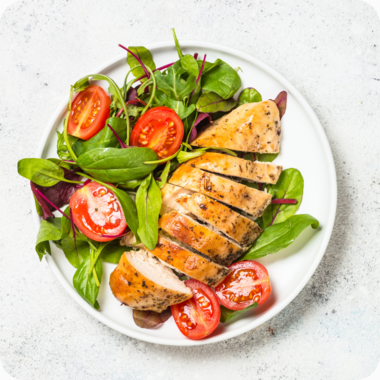 Fish and seafood:
Fish and seafood:
- Salmon
- Tuna fish
- Shrimps
- Squid
- Trout
- Mackerel
- Salmon
- Sardines
- Octopus
- Anchovy
- Sea bream
Vegetables:
- Spinach
- Broccoli
- Cauliflower
- Lettuce
- Cabbage
- Peppers
- Leek
- Sauerkraut
- Peas
- Eggplants
- Green beans
- Pumpkins
- Tomato
- Cucumber
- Mushrooms
- Celery
Fruits:
- Avocado
- Strawberries
- Kiwi
- Blackberries
- Raspberries
- Bilberry
- Coconut
- organic olives
Dairy products and cheeses:
- Yoghurt
- Pure butter
- Whipping cream
- Cheddar
- Slice
- Parmesan
- Guda
- Mozzarella
- Cottage cheese
- Mascarpone
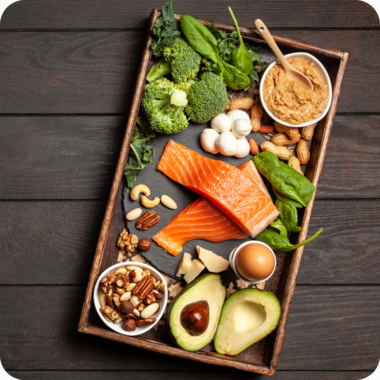 Nuts and seeds:
Nuts and seeds:
- Almonds
- Sunflower seeds
- Pumpkin seeds
- Natural tahini without honey
Sauces:
- Vinegar
- Pesto
- Mayonnaise
- Low sugar ketchup
- Mustard
- Homemade sauce
- Vinegar based sauces
- Tomato-based sauces without sugar
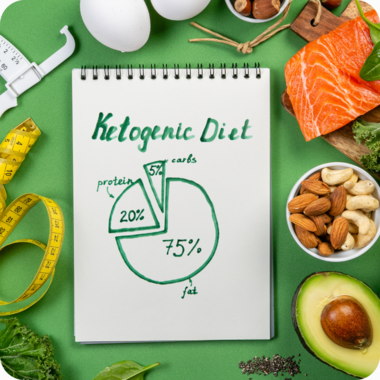
What should I not eat?
Some of the foods that are prohibited to be consumed during it
ketogenic diet are the folowing:
Sweets and soft drinks:
- Soft drinks with sugar
- Tea with sugar
- Energy drinks
- Juices
- Cake
- Ice cream
- Cookies
- Fruit juices
Cereals:
- Rice
- Bread
- Oats
- Pasta
- Wheat
- Cereal
Fruits with a lot of carbohydrates:
- Grapes
- Banana
- Pineapple
- Μήλα
- Oranges
Vegetables high in starch:
- Potatoes
- Pumpkin
- Corn
- Peas
Legumes:
- Lentils
- Black beans
- Beans
- Chickpeas
Possible side effects
Possible problems from
ketogenic diet are the following:
- Constipation: Reducing fiber consumption, by avoiding grains and legumes, can cause constipation.
- Lack of Vitamins and Metals: If you don't eat enough fruits, vegetables, and whole grains, you may not be getting enough vitamins and minerals, such as selenium, magnesium, phosphorus, and B and C vitamins.
- Kidney problems: This diet can overload the kidneys due to the high protein intake.
- Liver problems: High fat intake can put a strain on the liver, especially if problems already exist.
- Mood swing: The brain needs sugar from carbohydrates to function well. Low recruitment can be confusing.
Conclusion
Η
ketogenic diet it is a method for those who have tried other ways to lose weight without success. This diet is based on a special ratio
fats, proteins and carbohydrates. But, because every person is different, these ratios vary from case to case. If anyone is thinking of following her
ketogenic diet, it is important to talk to him first
doctor and a dietitian. This will help him be sure that the diet is safe for him and won't cause nutritional deficiencies or other problems. A dietitian can also help find the best way to reintroduce
carbohydrates in his diet, after reaching his weight goal.
Related products at
wecare.gr
Sources: 1.
Diet Review: Ketogenic Diet for Weight Loss, 2.
The Ketogenic Diet: A Detailed Beginner's Guide to Keto, 3.
What's a Ketogenic Diet?, 4.
20 Foods to Eat on the Keto Diet, 5.
What To Know Before You Go Keto, 6.
A Keto Diet Food List: What To Eat, 7.
100+ Keto Foods List: A Comprehensive Guide to Eating Keto, 8.
7 Keto Risks to Keep in Mind













